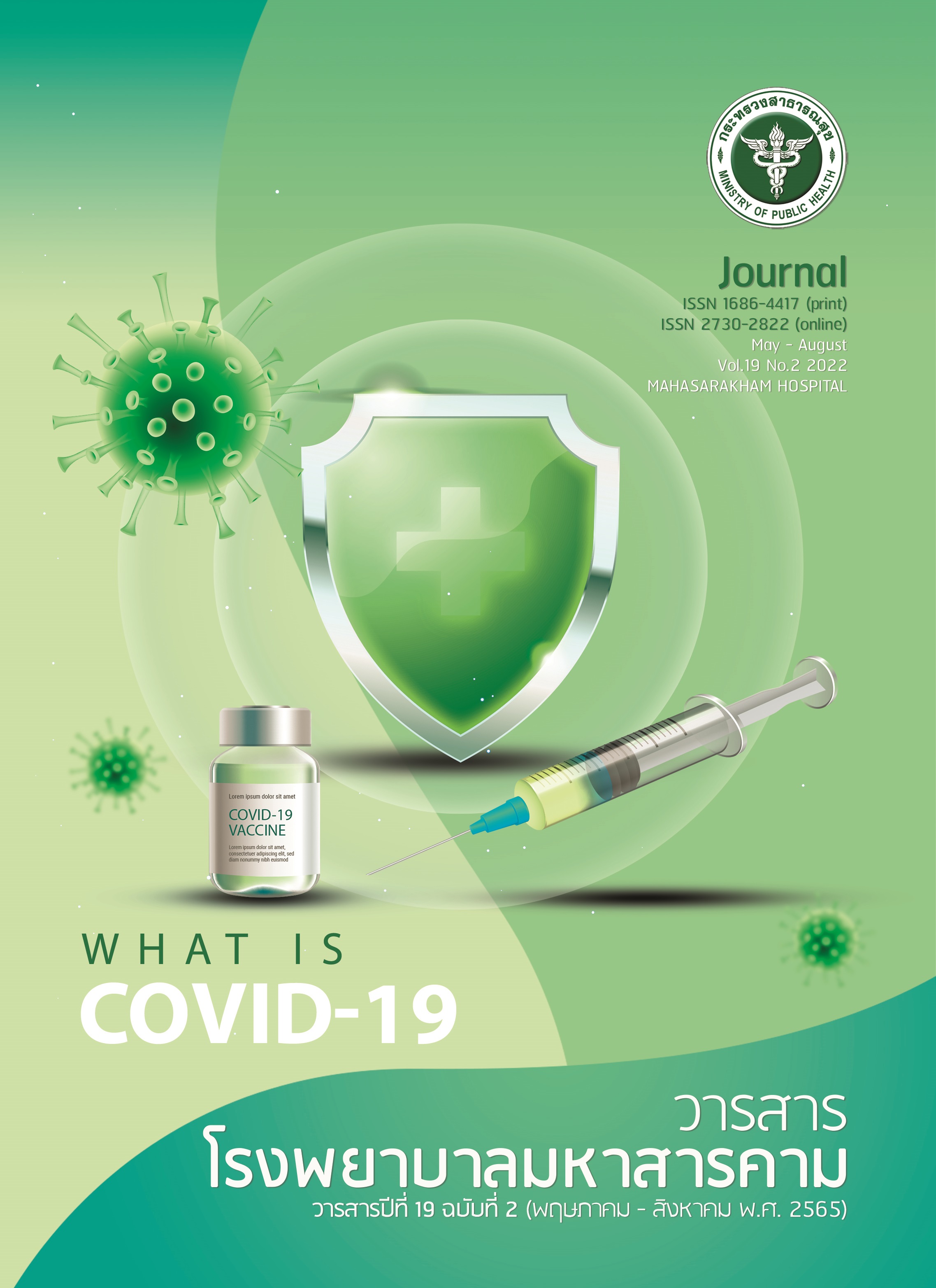การเปรียบเทียบการรักษามะเร็งลำไส้ตรงระยะลุกลามเฉพาะที่ที่ได้รับการฉายรังสีร่วมกับการให้ยาเคมีบำบัดก่อนการผ่าตัดกับการฉายรังสีร่วมกับการให้ยาเคมีบำบัดหลังการผ่าตัดในโรงพยาบาลร้อยเอ็ด
บทคัดย่อ
วัตถุประสงค์ : ศึกษาผลการรักษามะเร็งลำไส้ตรงระยะลุกลามเฉพาะที่ (Locally Advanced Rectal cancer)
ที่ได้รับการฉายรังสีร่วมกับการให้ยาเคมีบำบัดก่อนการผ่าตัด (Pre-operative concurrent chemoradiation) เทียบกับการฉายรังสีร่วมกับการให้ยาเคมีบำบัดหลังการผ่าตัด (Post-operative concurrent chemoradiation)และปัจจัยที่เกี่ยวข้องในโรงพยาบาลร้อยเอ็ด
วิธีการศึกษา : เป็นการศึกษาวิจัยเชิงวิเคราะห์ (Analytic study by retrospective data collection) โดยเก็บข้อมูลผู้ป่วยและการรักษาจากเวชระเบียน ฐานข้อมูลการวางแผนการฉายรังสี (Eclipse Treatment Planning System) และการสอบถามอาการทางโทรศัพท์ จากผู้ป่วยที่ได้รับการวินิจฉัยมะเร็งลำไส้ตรงระยะลุกลามเฉพาะที่เฉพาะที่ (Locally Advanced Rectal cancer) ที่ได้รับการฉายรังสีร่วมกับการให้ยาเคมีบำบัดก่อนการผ่าตัด (Pre-operative concurrent chemoradiation) เทียบกับการฉายรังสีร่วมกับการให้ยาเคมีบำบัดหลังการผ่าตัด (Post-operative concurrent chemoradiation) ตั้งแต่ 1 ตุลาคม 2560 - 31 ธันวาคม 2563
ผลการศึกษา : 1. การศึกษานี้พบว่าการฉายรังสีร่วมกับการให้ยาเคมีบำบัดก่อนการผ่าตัด (Pre-operative concurrent chemoradiation) เทียบกับการฉายรังสีร่วมกับการให้ยาเคมีบำบัดหลังการผ่าตัด (Post-operative concurrent chemoradiation) ไม่พบความแตกต่างอย่างมีนัยสำคัญทางสถิติในแง่ผลการรักษาทั้ง Loco
regional control, Disease free survival และ overall survival 2. ปัจจัยด้าน อายุ, เพศ, ระยะของโรค
(T stage, N stage), Tumor Grade, Resected margin status, Lympho-vascular invasion status, Surgery procedure, CEA level ไม่มีความสัมพันธ์อย่างมีนัยสำคัญทางสถิติกับ Loco-regional control, Disease free survival และ overall survival มีเพียง Resected margin status ที่พบว่ามีความสัมพันธ์กับ Disease free survival อย่างมีนัยสำคัญทางสถิติ 3. กลุ่มที่ได้รับการฉายรังสีร่วมกับการให้ยาเคมีบำบัดก่อนการผ่าตัด (Pre-operative concurrent chemoradiation) พบภาวะแทรกซ้อนทางระบบทางเดินอาหาร (Gastrointestinal Toxicity) ต่ำกว่าในกลุ่มที่ได้รับการฉายรังสีร่วมกับการให้ยาเคมีบำบัดหลังการผ่าตัด (Post-operative concurrent chemoradiation) อย่างมีนัยสำคัญทางสถิติ แต่ไม่พบความแตกต่างของภาวะแทรกซ้อนทางโลหิตวิทยา (Hematologic Toxicity) และระบบผิวหนัง (Dermatologic Toxicity) 4. นอกจากนี้ยังพบอัตราการตอบสนองต่อการรักษาอย่างสมบูรณ์ (Pathological Complete Response) ในกลุ่มได้รับการฉายรังสีร่วมกับการให้ยาเคมีบำบัดก่อนการผ่าตัด (Pre-operative concurrent chemoradiation) สูงถึง 20%
สรุปผลการศึกษา : จากการศึกษา ไม่พบความแตกต่างอย่างมีนัยสำคัญทางสถิติในแง่ผลการรักษาและปัจจัยที่มีผลต่อการรักษาในกลุ่มที่ได้รับการฉายรังสีร่วมกับการให้ยาเคมีบำบัดก่อนการผ่าตัด (Pre-operative concurrent chemoradiation) เทียบกับการฉายรังสีร่วมกับการให้ยาเคมีบำบัดหลังการผ่าตัด (Post-operative concurrent chemoradiation) ซึ่งอาจจะต้องอาศัยจำนวนผู้ป่วยและระยะเวลาการติดตามการรักษาที่มากขึ้น ในกลุ่มที่ได้รับการฉายรังสีร่วมกับการให้ยาเคมีบำบัดก่อนการผ่าตัด (Pre-operative concurrent chemoradiation)
พบภาวะแทรกซ้อนทางระบบทางเดินอาหารต่ำกว่าซึ่งสอดคล้องกับงานวิจัยอื่นๆและยังพบว่าอัตราการตอบสนองต่อการรักษาอย่างสมบูรณ์ (Pathological Complete Response) อยู่ในเกณฑ์ที่ดีเมื่อเทียบกับการศึกษาที่ผ่านมา
เอกสารอ้างอิง
Jin-hong Park, Sang Min Yoon, Chang Sik Yu, Jong Hoon Kim, Tae Won Kim, Jin Cheon Kim. Randomized phase 3 trial comparing preoperative and postoperative chemoradiotherapy with capecitabine for locally advanced rectal cancer. Cancer. 2011 Aug 15;117(16):3703–12.
Rolf Sauer, Heinz Becker, Werner Hohenberger, Claus Rödel, Christian Wittekind, Rainer Fietkau, et al. Preoperative versus Postoperative Chemoradiotherapy for Rectal Cancer. N Engl J Med. 2004 Oct 21;351(17):1731–40.
Pichayada Darunikorn, Putipun Puataweepong, Mantana Dhanachai, Somjai Dangprasert, Thiti Swangsilpa, Chomporn Sitathanee, et al. Long Term Outcomes of Preoperative versus Postoperative Concurrent Chemoradiation for Locally Advanced Rectal Cancer: Experience from Ramathibodi Medical School in Thailand. Asian Pac J Cancer Prev APJCP. 2015;16(16):7315–9.
Chung-Hung Yeh, Miao-Fen Chen, Chia-Hsuan Lai, Wen-Shih Huang, Steve P. Lee, Wen-Cheng Chen. Comparison of treatment results between surgery alone, preoperative short-course radiotherapy, or long-course concurrent chemoradiotherapy in locally advanced rectal cancer. Int J Clin Oncol. 2012 Oct;17(5):482–90.
Jeong Won Lee, Jong Hoon Lee, Jun-Gi Kim, Seong Taek Oh, Hyuk Jun Chung, Myung Ah Lee, et al. Comparison between preoperative and postoperative concurrent chemoradiotherapy for rectal cancer: an institutional analysis. Radiat Oncol J. 2013 Sep;31(3):155–61.
Euncheol Choi, Jin Hee Kim, Ok Bae Kim, Mi Young Kim, Young Ki Oh, Sung Gyu Baek. Predictors of pathologic complete response after preoperative concurrent chemoradiotherapy of rectal cancer: a single center experience. Radiat Oncol J. 2016 Jun;34(2):106–12.
Simon Wilkins, Andrew Haydon, Ian Porter, Karen Oliva, Margaret Staples, Peter Carne, et al. Complete Pathological Response After Neoadjuvant Long-Course Chemoradiotherapy for Rectal Cancer and Its Relationship to the Degree of T3 Mesorectal Invasion. Dis Colon Rectum. 2016 May;59(5):361–8.
Prajnan Das, John M. Skibber, Miguel A. Rodriguez-Bigas, Barry W. Feig, George J. Chang, Robert A. Wolff, et al. Predictors of tumor response and downstaging in patients who receive preoperative chemoradiation for rectal cancer. Cancer. 2007 May 1;109(9):1750–5.
Thitipong Setthalikhit, Chairat Supsamutchai, Chumpon Wilasrusmee, Tharin Thampongsa, Jakrapan Jirasiritham, Jirat Teerapradith, et al. Predictive Factors of Pathologic Complete Response after Preoperative Chemoradiation in Rectal Cancer. Thai J Surg. 2021 Mar 30;42(1):14–22.
Chiara Carlomagno, Stefano Pepe, Francesco Paolo D’Armiento, Maria D’Armiento, Lucia Cannella, Alfonso De Stefano, et al. Predictive factors of complete response to neoadjuvant chemoradiotherapy in patients with rectal cancer. Oncology. 2010;78(5–6):369–75.
ดาวน์โหลด
เผยแพร่แล้ว
รูปแบบการอ้างอิง
ฉบับ
ประเภทบทความ
สัญญาอนุญาต
ลิขสิทธิ์ (c) 2022 วารสารโรงพยาบาลมหาสารคาม

อนุญาตภายใต้เงื่อนไข Creative Commons Attribution-NonCommercial-NoDerivatives 4.0 International License.
วารสารนี้เป็นลิขสิทธิ์ของโรงพยาบาลมหาสารคาม






